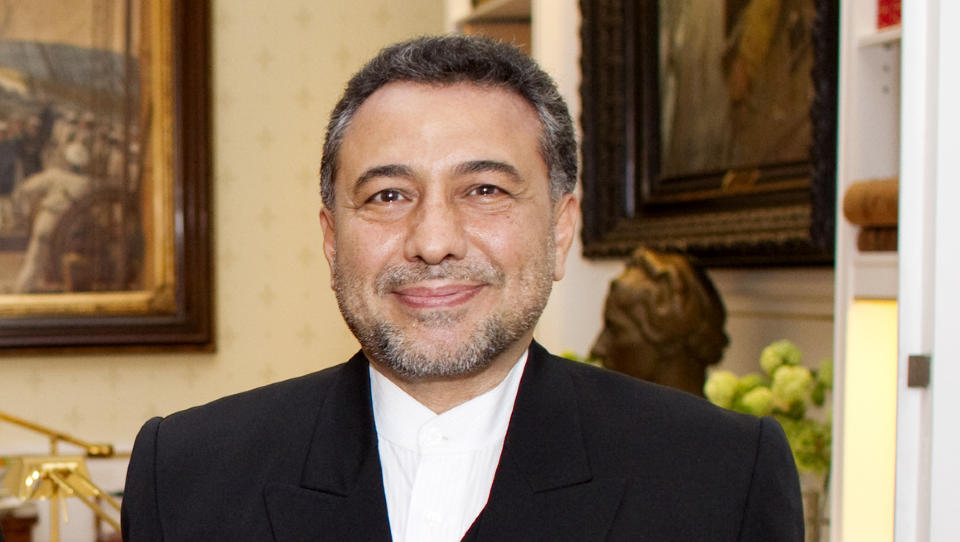On Monday, 5 July, Iran’s ambassador to Norway, Seyed Hossein Rezvani, was summoned to the Foreign Ministry to receive a formal diplomatic condemnation of death sentences in Iran, in particular the case against Sakineh Ashtiani. On his way he was met by journalists and photographers.
He quite obviously did not like this, and in a comment to Dagbladet complains about the way he was treated. In the usual style we have got accustomed to from IRI officials, he tries to come across as the real victim and accuses everyone else of lies and disinformation.
Sakineh Ashtiani has been sentenced to death by stoning for alleged adultery, but ambassador Rezvani told Dagbladet that the case against her had not been decided yet, and denied that she will be stoned. He also claimed that stoning is no longer a practice used in Iran.
Other comments from Rezvani according to Dagbladet:
- State Secretary Espen Barth Eide did not have enough information about the case, so I had to update him.
- This is unacceptable. Especially since the matter is not settled, any criticism is premature.
- The legal process is still running, and any comment about her case will be to interfere in the independence of the judicial system in Iran.
- Norway shows a double morale. This is part of a political campaign to put pressure on Iran. It's an excuse to launch a political campaign against Iran.
- It would be better to discuss the topic in a meeting, or possibly via a simple phone call.
- It is unfortunate that it should go so far that I would be called to the Foreign Ministry.
- I asked Barth Eide if he would protect human rights rather than to launch political campaigns.
It sure is tough to be Iran’s ambassador these days. And if this wasn't enough the TV news continued torturing him till late in the night by setting this case up as number one.
Good job from Norway’s Foreign Ministry. Keep it up!
This blog will be used to post some material from #iranelection on Twitter and Facebook, plus other news about the current situation in Iran focusing on human rights violations
7 July 2010
6 July 2010
Norway condemns death sentences in Iran
Source: Norway's Ministry of Foreign Affairs
6 July, State Secretary Espen Barth Eide summoned the Iranian Ambassador, Seyed Hossein Rezvani, to the Ministry of Foreign Affairs in connection with two death sentences in Iran.
Sakineh Mohammadi Ashtiani has been sentenced to death by stoning for infidelity, and Mohammad Reza Haddadi has been sentenced to death for an crime allegedly committed when he was a minor. The case of Majid Tavakkoli was also raised. Mr Tavakkoli has been imprisoned for his political activities as a student, and is serving his sentence in isolation.
Mr Barth Eide commented: “In my meeting with the Iranian Ambassador, I raised three specific cases, each of which are cause for grave concern. We view execution by stoning as an inhuman and barbaric form of punishment and we condemn it. The same applies to the use of the death penalty for crimes committed by minors. In addition, we take a very critical view of imprisonment for the expression of political views.
“Besides, these sentences are in violation of Iran’s obligations under its national law and under international conventions to which Iran is a party.”
In addition to these three cases, it was also emphasised that Norway opposes the death penalty in principle and in all circumstances, and that Iran has committed itself to following the International Covenant on Civil and Political Rights (ICCPR) and the UN Convention on the Rights of the Child (CRC). Iran was also urged to discontinue stoning as a form of punishment.
6 July, State Secretary Espen Barth Eide summoned the Iranian Ambassador, Seyed Hossein Rezvani, to the Ministry of Foreign Affairs in connection with two death sentences in Iran.
Sakineh Mohammadi Ashtiani has been sentenced to death by stoning for infidelity, and Mohammad Reza Haddadi has been sentenced to death for an crime allegedly committed when he was a minor. The case of Majid Tavakkoli was also raised. Mr Tavakkoli has been imprisoned for his political activities as a student, and is serving his sentence in isolation.
Mr Barth Eide commented: “In my meeting with the Iranian Ambassador, I raised three specific cases, each of which are cause for grave concern. We view execution by stoning as an inhuman and barbaric form of punishment and we condemn it. The same applies to the use of the death penalty for crimes committed by minors. In addition, we take a very critical view of imprisonment for the expression of political views.
“Besides, these sentences are in violation of Iran’s obligations under its national law and under international conventions to which Iran is a party.”
In addition to these three cases, it was also emphasised that Norway opposes the death penalty in principle and in all circumstances, and that Iran has committed itself to following the International Covenant on Civil and Political Rights (ICCPR) and the UN Convention on the Rights of the Child (CRC). Iran was also urged to discontinue stoning as a form of punishment.
Subscribe to:
Comments (Atom)
